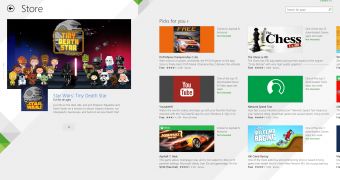Microsoft continues to bet big on the Windows Store, especially after the launch of Windows 8.1, trying to lure developers into porting more and more apps to the new modern platform.
Even though several high-quality apps have recently landed in the store, including Facebook and Flipboard, analysts believe that developers might actually lose interest in Windows 8 and 8.1 due to the fact that most consumers buy the operating systems to use them on desktop computers.
“While the PC Relevant Products/Services market is shrinking, the overall volumes are still sizeable compared to the user base for tablets. So shouldn't sales of Windows 8/8.1-based PCs be driving volume and, therefore, developer interest? Why aren't developers taking this user base into account?” Sameer Singh, a Tech Thoughts analyst, was quoted as saying by News Factor.
“The answer is simple: Most Windows 8 devices are bought as PCs, not tablets. Slapping a tablet Relevant Products/Services interface (or a touchscreen Relevant Products/Services) onto a PC doesn't address this problem.”
And this pretty much makes sense. Microsoft promoted both Windows 8 and 8.1 as excellent opportunities for developers who wanted to monetize their apps, but at the same time, the company tried to improve the desktop side of the operating systems.
Sales of Windows tablets remain relatively low, even though Windows 8.1 also incorporates a number of improvements aimed at touch-capable devices and despite the arrival of the second-generation Surface model.
As a result, more adopters stay away from the Modern UI and choose to run desktop apps, using their computers in the traditional way, as with any other Windows version.
“Most users would spend very limited time in the Metro interface and switch back to desktop for the jobs they needed the PC to accomplish. As a result, the Windows 8 store has been relegated to the background and developers are losing interest in the platform,” Singh concluded.

 14 DAY TRIAL //
14 DAY TRIAL //